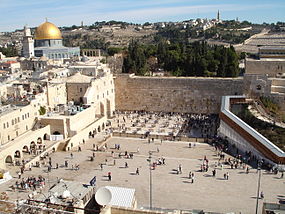 That would be Rabbi Debra Cantor, who presides over B’nai Tikvoh-Sholom in Bloomfield, Connecticut. She was participating in the monthly gathering of Women at the Wall (WOW), an organization dedicated to the proposition that adult Jewish women have the right to wear prayer shawls and read from the Torah (a liturgical practice traditionally reserved to adult Jewish men) at the Western Wall of the Temple Mount in Jerusalem.
That would be Rabbi Debra Cantor, who presides over B’nai Tikvoh-Sholom in Bloomfield, Connecticut. She was participating in the monthly gathering of Women at the Wall (WOW), an organization dedicated to the proposition that adult Jewish women have the right to wear prayer shawls and read from the Torah (a liturgical practice traditionally reserved to adult Jewish men) at the Western Wall of the Temple Mount in Jerusalem.
WOW members began showing up to worship according to their lights in the women’s section of the Western Wall plaza in 1988, and ever since have been subject to considerable verbal and some physical abuse. In 2000, the Israeli Supreme Court issued a ruling recognizing their right to worship once a month at the plaza, but then in 2003 reversed itself, deciding they would only be able to do so off to the side of the wall itself, at a site known as Robinson’s Arch.
The result has been WOW civil disobedience, with the authorities regularly detaining and occasionally sanctioning those who show up to do their thing. The plaza and its environs are governed by the government-funded Western Wall Heritage Foundation, whose decision-maker is a haredi (ultra-orthodox) rabbi named Shmuel Rabinowitz. WOW has filed a lawsuit challenging haredi control of the foundation. In December, Prime Minister Binyamin Netanyahu asked Natan Sharansky, the former Soviet dissident who now heads the Jewish Agency, to devise a solution.
After Rabbi Cantor and nine other protesters were arrested, Sharansky, meeting with a group of American Jewish leaders in Israel, sounded very much like the old joke about the rabbi who agrees with both sides in a dispute. “When I listen to the very partial presentation, I am fully with them–when I listen to the other side, I have to accept that they also have logic,” Sharansky said. In the joke, when a congregant informs the rabbi that he can’t agree with both sides, he replies, “I agree with you too.”
Since capturing the Old City in the 1967, the State of Israel has replaced Masada, the hill fort overlooking the Dead Sea, with the Wall as the emblematic site of national identity. The idea that it should operate under the control of haredi leaders, some of whom reject the legitimacy of the state, is (to put no finer point on it) ironic.
In Jerusalem last summer, my wife and I observed a group of haredi boys gazing raptly at an outfit of Israeli women soldiers taking their oath of allegiance in front of the Western Wall plaza. I thought the boys were ogling the girls in uniform. My wife thought they were imagining what it would be like to be in uniform themselves. Would it be the end of the world if they also got to witness women reading from the Torah?
In its 2003 decision, the Israeli Supreme Court cited the need to prevent violent incidents between the two sides. Never mind that the violence has come entirely from the haredi side. Somehow, the Israeli authorities have managed to work out an arrangement for both Jews and Muslims to worship at the Cave of the Patriarchs in Hebron, where extreme acts of violence on both sides occurred between 1929 and 1994. You’d think it would not be beyond their capacity to accommodate the practices of both haredim and WOW at the omphalos of the Jewish world. In the meantime, you go, girls!





